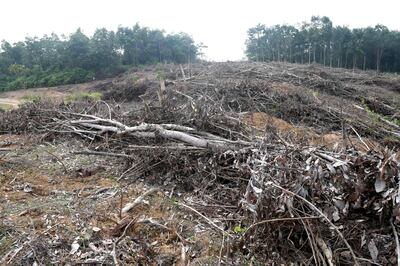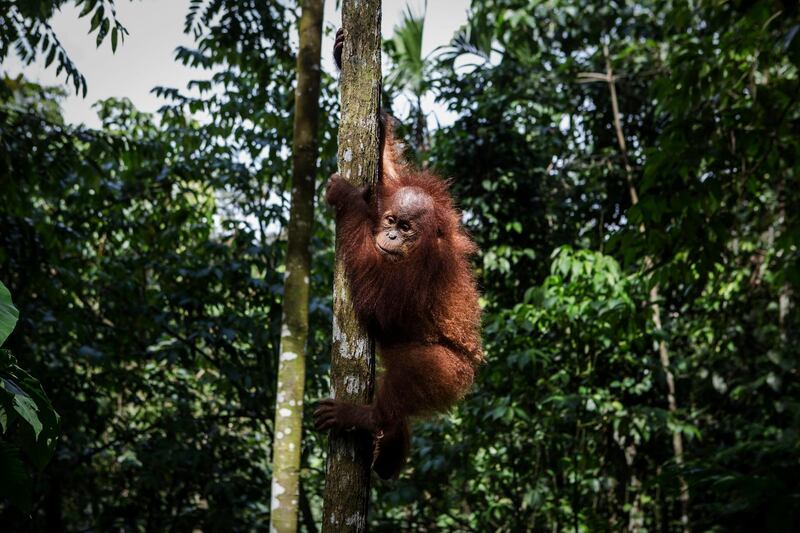Out of sight, out of mind. If there’s one human trait that’s responsible for the continued ravaging and destruction of our planet, it’s that. The things we buy, eat, use, wear – in the main we are blissfully unaware of (and, let’s be frank, disinterested in) the collective impact they have on the people and countries producing them. It seems like we can’t go a day without being told from up on high that another ecological disaster is on its way, that if we don’t stop doing something or other, the very existence of human beings will become impossible.
We’ve heard so many shocking statistics and stories that we are no longer shocked, and the knock-on effect is that we rarely react with a sense of urgency to change our ways for the greater good. But change our ways we must, if there is to be any hope for future generations. Let’s start with palm oil.
Persistent problem
While doing your grocery shopping, you might have started to see and wondered about packaging that mentions “no palm oil” or “ethically sourced palm oil”. Palm oil, which is produced by pressing the fruit of tropical palm trees, is to be found, according to the United Nations Environment Programme, in 50 per cent of all products on the shelves of supermarkets. From detergents and toothpaste, to ice cream, biscuits, margarine and frozen pizzas, if you see “vegetable oil” anywhere on the label, chances are that it is palm oil.
Yet how many of us check the ingredients of the liquid detergent used in the washing machine? How about those candles that cast a warm and fragrant glow at night? You might have started paying more attention to what cosmetics are made from, with vegan beauty products surging in popularity, but do you care about your vegetable oil and where it comes from? The trick is in the natural-sounding name – surely palm oil is preferable to mineral oil or animal fats? Unfortunately, it’s far from being that simple.
Scary statistics
According to environmental pressure group Greenpeace, oil-palm plantations cover more than 27 million hectares of our planet, and every year 66 million tonnes of it are produced by countries that happen to be where our most diverse ecosystems exist. The biggest producers are Indonesia and Malaysia, which together account for 85 per cent, with Africa, and North and South America responsible for the rest. These areas of lush jungle and forests help to keep the planet's air breathable and the climate stable – once these are damaged beyond repair, the effects will be felt everywhere. And it's the constant destruction of these natural habitats to use them for livestock rearing and palm-oil plantations that is doing most of the damage.
It’s estimated by the World Wildlife Fund that every hour of every day, a rainforest area the equivalent of 300 football fields is cleared to make way for palm-oil production. Surely, though, if these farmers are taking down trees in order to plant more of another kind in their place, that’s restoring the balance? Again, no.
When rainforests are replaced by palm plantations, the environmental impact is devastating. To clear the land – a three-metre diameter clearance is required around each palm tree – existing vegetation is felled and burnt. Indonesia, where up to 80 per cent of deforestation takes place illegally, is now the world's third biggest emitter of greenhouse gases – only the United States and China pollute more – because of the burning, which causes a toxic haze to hang in the air. This is believed to be responsible for more than 100,000 premature deaths each year across South East Asia.
In the clearing process, workers take no prisoners, and animal species are being wiped out. Various types of elephant, tiger, rhinoceros, bear and leopard are facing imminent extinction because of the loss of their natural habitat – monoculture is no good for biological diversity. However, it is the Sumatran orangutan that has, deservedly, become the poster primate for environmental lobbyists. The apes' tree homes in Indonesia are bulldozed and 50 are killed every week. These magnificent and highly intelligent mammals – our closest relatives – are viewed as vermin by plantation workers and are routinely clubbed, killed with machetes, starved to death or buried alive. It is believed that more than 50,000 have been killed in the past two decades, and the species is now classified as critically endangered. As if that wasn't grim enough, the resultant soil erosion and upset caused to the water table wreak their own unique havocs.
Much of this could be avoided. The WWF maintains that there are 20 million hectares of abandoned land in Indonesia that would be perfectly suitable for palm-oil plantations, but the companies that produce it are tied in with timber companies that buy the valuable wood. So the plantation owners get paid twice – for the timber and then the oil – corporate greed being responsible for human and animal populations being displaced, as villages are wiped out to make room for those oil-bearing palms.
Potential solutions
Can we do anything about this? Yes, we certainly can. In much the same way as blood diamonds have become a social no-no, the oil produced at the expense of rainforests, wildlife, and enslaved workers and indigenous communities has come to be known as "conflict palm oil", and many of the world's largest corporations are now being exposed by pressure groups such as Greenpeace and Rainforest Action Network (Ran) for continuing to use unsustainably produced oil, despite promises that they would change their ways.
Unilever, Nestlé, Mondelez, Mars, General Mills, Hershey's, Kellogg's, PepsiCo, Kraft Heinz, Smucker's, Campbell's, Conagra Foods, Dunkin' Brands, Grupo Bimbo, Hormel Foods, Krispy Kreme, Nissin Foods, Toyo Suisan Kaisha, Hillshire Brands Company and Tyson Foods – together known by Ran as the Snack Food 20 group – have all been named and shamed for continuing to use conflict palm oil, and the pressure is building.
PepsiCo, the largest globally distributed snack food company, used 482,194 metric tonnes of palm oil in 2016 alone and, in the past few days, has faced high-profile protests at its New York offices because of its relationship with Indofood, which not only supplies it with palm-oil products, but also has been linked to serious human rights abuses and exploitation of plantation workers.

Not all big corporations are paying lip service to improving matters, however. Britain's supermarket giant Iceland made headlines in the past few days for announcing that this year it will cease using palm oil in its own branded products, after Greenpeace activists had shown the damage it does. Cosmetics company Lush had its own conscience pricked last year and joined forces with the conservation group Sumatran Orangutan Society (Sos) to reverse some of the destruction.
Lush's head buyer, Simon Constantine, says: "It was the Sumatran Orangutan Society that took the time to show me, first-hand, the impact that our ingredients were having in Sumatra. Since then we established a commitment to change the way Lush works, removing palm oil from our soap base and glycerine, for example, and to try to rectify the damage that was done."
Apart from producing thousands of Orangutan soap bars that contain no palm oil, the company used the proceeds from the sales to fund the purchase of two areas of deforested land in Sumatra totalling 100 hectares, which are now being restored to native rainforest – a process that takes only a few years thanks to the tropical conditions.
"I think this was a turning point," says Constantine, "to realise that we can't just do the least bad thing anymore, but have to commit to creating solutions to the problems that palm and other ingredients cause. I have yet to meet as effective an organisation as Sos that can show real solutions on the ground, regrowing over 500 hectares of rainforest on land that was illegal palm plantations just 10 years ago."
It's a start, isn't it? And as with many socially impactful movements, the more we hear, read and think about the consequences of our actions, the more likely it is that human behaviour will change. The United Nations expects the world's population to reach 10 billion within the next four decades, meaning demand for this oil is likely to increase. And it's worth noting that the product in itself is not evil – it's the way in which it is produced by corrupt corporations that cannot see beyond the profits they amass. That behaviour will only change if governments take drastic action to stamp it out but, as we have seen when it comes to other aspects of factory farming, the food lobbyists have countless politicians in their pockets.
Steps being taken in the UAE
Rather than lose all hope, take heart that right here in the UAE steps are being taken to introduce a viable and sustainable alternative to palm oil. Scientists at the New York University Abu Dhabi last year said that they had been working with a species of alga found here, which naturally produces large quantities of palmitic acid – one of the main components of palm oil.
“It could potentially be a good substitute for many of the uses of palm oil,” says Kourosh Salehi-Ashtiani, associate professor of biology at the university, adding that the algae grow in fresh or salt water, and could be effectively farmed even in desert areas.
The positive impact of this discovery should not be underplayed and, while mass production is, admits Salehi-Ashtiani, still some way off, it's another step in the right direction. In the meantime, the least we can do is to steer clear of anything we know to contain unsustainable palm oil. And if that means taking a few extra minutes to check the small print while doing our shopping, so be it. The way in which palm oil is produced might be out of sight, but it should never be out of mind.
____________________
Read more:
Waste, pesticides and climate change pose alarming threat to food security, Dubai event hears
Green algae found in UAE could produce alternative to palm oil
[ The slick way to choose which cooking oil is best for your health and in your food ]
____________________





